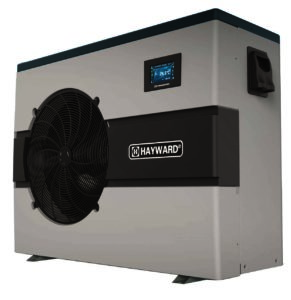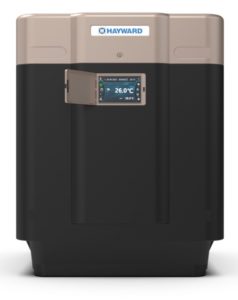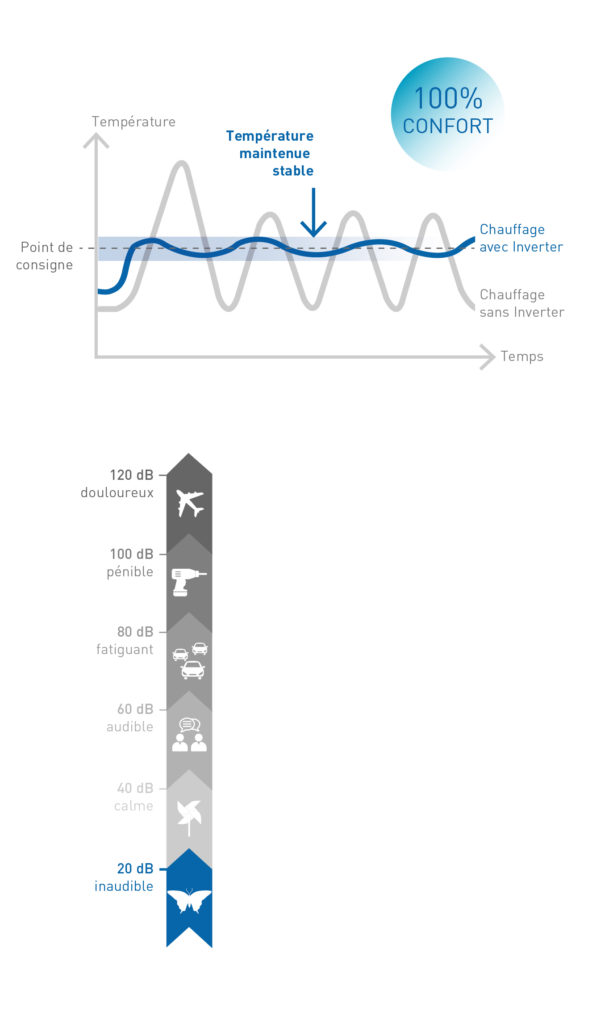A pool heat pump is a device used to heat the water in a pool using thermal energy from the ambient air. It works on the same principle as a domestic heat pump, but its purpose is to heat the water in the pool rather than the air in a house. Here’s how a pool heat pump usually works

- Heat capture : The heat pump draws heat from the outside air, even in cold weather, thanks to an evaporator. It uses a refrigerant that evaporates at low temperatures to absorb heat from the air.
- Compression : Once the refrigerant has evaporated and absorbed heat, it is compressed by a compressor, raising its temperature.
- Heat transfer : The hot refrigerant circulates through a heat exchanger located in the pool’s filtration system. There, it transfers the heat it has absorbed from the outside air to the pool water.
- Cycle Repeat : The refrigerant is then relaxed, returning to its initial state, and the cycle begins again.
- The advantages of a pool heat pump are as follows:
- Energy efficiency : They are very efficient because they mainly use electrical energy to run the compressor, but they extract most of the heat from the outside air.
- Low cost of ownership : Compared to other pool heating methods, such as gas water heaters, heat pumps are generally cheaper to operate.
- Environmentally friendly: They are more environmentally friendly than combustion heating systems because they do not produce greenhouse gases when they are running.
- Extended pool use: Heat pumps help maintain a comfortable pool water temperature, allowing for extended pool use during cooler seasons.


At Astro Piscines, we have chosen to work with Hayward. Their Energyline Full Inverter heat pumps : here’s how it works in detail:
- High Performance Inverter Compressor: The Inverter Compressor is designed to be more efficient by modulating its operating speed. Unlike a conventional compressor that runs at full capacity until the desired temperature is reached, an inverter compressor adjusts its speed according to the heat demand of the pool. This means that it can operate at low speeds when the heating demand is low, saving energy.
- DC Technology Inverter Fan: The Inverter Fan works in a similar way. It can adjust its speed as needed, allowing it to adapt to weather conditions. For example, in cooler weather, it can run at a lower speed to avoid dispersing too much heat outside, while when needed, it can increase its speed to maximize heat transfer efficiency.
- Rapid temperature rise : Thanks to the precise modulation of the compressor and fan power, an inverter heat pump can heat the pool water faster than a conventional heat pump. This means you can enjoy your pool earlier in the season.
- Precise temperature maintenance : Inverter technology also allows the temperature of the pool water to be maintained very precisely. Once the desired temperature is reached, the heat pump automatically adjusts its power to prevent overheating or underheating.
- Significant energy savings : By continuously adjusting the power according to actual needs, an inverter heat pump can significantly reduce energy consumption compared to a conventional heat pump, which often runs at full power and stops abruptly once the temperature is reached.
In summary, a pool heat pump equipped with inverter technology offers benefits such as rapid temperature rise, precise temperature maintenance, and significant energy savings, making it an attractive choice for heating a pool efficiently and economically. However, it’s important to note that these systems tend to have a higher upfront cost than traditional heat pumps, but long-term energy savings can make up for this extra expense.

